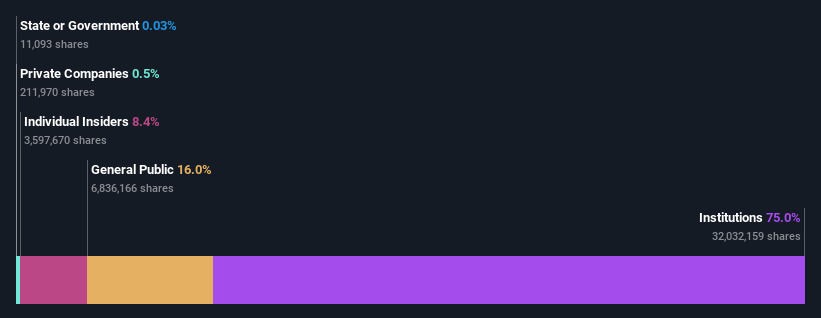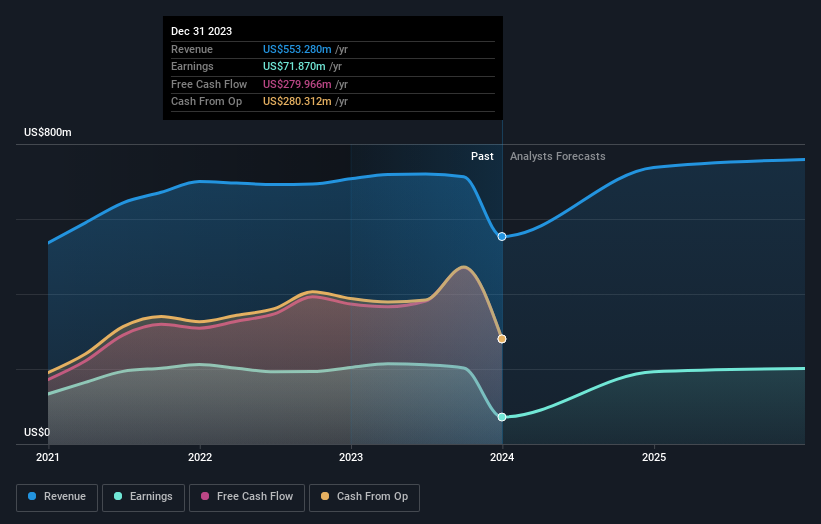After losing 19% in the past year, Heartland Financial USA, Inc. (NASDAQ:HTLF) institutional owners must be relieved by the recent gain
Key Insights
Given the large stake in the stock by institutions, Heartland Financial USA's stock price might be vulnerable to their trading decisions
50% of the business is held by the top 10 shareholders
Every investor in Heartland Financial USA, Inc. (NASDAQ:HTLF) should be aware of the most powerful shareholder groups. The group holding the most number of shares in the company, around 75% to be precise, is institutions. Put another way, the group faces the maximum upside potential (or downside risk).
Institutional investors would probably welcome last week's 3.6% increase in the share price after a year of 19% losses as a sign that returns may to begin trending higher.
In the chart below, we zoom in on the different ownership groups of Heartland Financial USA.
Check out our latest analysis for Heartland Financial USA
What Does The Institutional Ownership Tell Us About Heartland Financial USA?
Institutional investors commonly compare their own returns to the returns of a commonly followed index. So they generally do consider buying larger companies that are included in the relevant benchmark index.
Heartland Financial USA already has institutions on the share registry. Indeed, they own a respectable stake in the company. This can indicate that the company has a certain degree of credibility in the investment community. However, it is best to be wary of relying on the supposed validation that comes with institutional investors. They too, get it wrong sometimes. When multiple institutions own a stock, there's always a risk that they are in a 'crowded trade'. When such a trade goes wrong, multiple parties may compete to sell stock fast. This risk is higher in a company without a history of growth. You can see Heartland Financial USA's historic earnings and revenue below, but keep in mind there's always more to the story.
Investors should note that institutions actually own more than half the company, so they can collectively wield significant power. We note that hedge funds don't have a meaningful investment in Heartland Financial USA. BlackRock, Inc. is currently the largest shareholder, with 14% of shares outstanding. In comparison, the second and third largest shareholders hold about 7.6% and 6.2% of the stock.
We did some more digging and found that 10 of the top shareholders account for roughly 50% of the register, implying that along with larger shareholders, there are a few smaller shareholders, thereby balancing out each others interests somewhat.
Researching institutional ownership is a good way to gauge and filter a stock's expected performance. The same can be achieved by studying analyst sentiments. Quite a few analysts cover the stock, so you could look into forecast growth quite easily.
Insider Ownership Of Heartland Financial USA
While the precise definition of an insider can be subjective, almost everyone considers board members to be insiders. Company management run the business, but the CEO will answer to the board, even if he or she is a member of it.
Insider ownership is positive when it signals leadership are thinking like the true owners of the company. However, high insider ownership can also give immense power to a small group within the company. This can be negative in some circumstances.
Shareholders would probably be interested to learn that insiders own shares in Heartland Financial USA, Inc.. The insiders have a meaningful stake worth US$126m. Most would see this as a real positive. If you would like to explore the question of insider alignment, you can click here to see if insiders have been buying or selling.
General Public Ownership
The general public-- including retail investors -- own 16% stake in the company, and hence can't easily be ignored. This size of ownership, while considerable, may not be enough to change company policy if the decision is not in sync with other large shareholders.
Next Steps:
While it is well worth considering the different groups that own a company, there are other factors that are even more important. To that end, you should be aware of the 2 warning signs we've spotted with Heartland Financial USA .
Ultimately the future is most important. You can access this free report on analyst forecasts for the company.
NB: Figures in this article are calculated using data from the last twelve months, which refer to the 12-month period ending on the last date of the month the financial statement is dated. This may not be consistent with full year annual report figures.
Have feedback on this article? Concerned about the content? Get in touch with us directly. Alternatively, email editorial-team (at) simplywallst.com.
This article by Simply Wall St is general in nature. We provide commentary based on historical data and analyst forecasts only using an unbiased methodology and our articles are not intended to be financial advice. It does not constitute a recommendation to buy or sell any stock, and does not take account of your objectives, or your financial situation. We aim to bring you long-term focused analysis driven by fundamental data. Note that our analysis may not factor in the latest price-sensitive company announcements or qualitative material. Simply Wall St has no position in any stocks mentioned.


